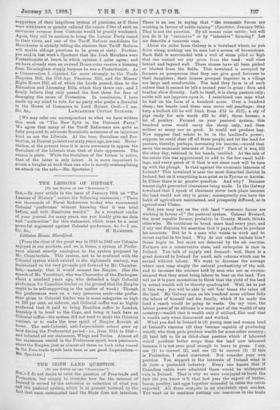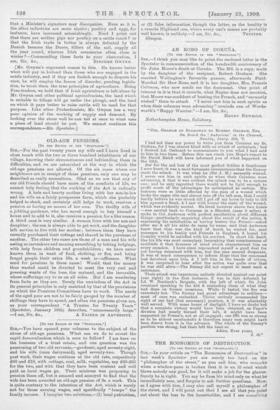THE IRISH LAND QUESTION.
/TO Tils EDITOR Or Talc " SPROTATOR.1 18Ilt•".--I do not desire to raise the question of Free-trade and Protection, but simply to consider how far the interest of Ireland is served by the extension or reduction of what you tall the pastoral system, which is at present fostered by the fact that upon untenanted land the State does not interfere. There is no use in saying that " the economic forces are working in favour of cattle-raising " (Spectator, January 16th). That is not the question. By all means raise cattle; but will you do it by " extensive " or by " intensive " farming P Let me describe a concrete case.
About six miles from Galway is a townland where, as you drive along, nothing can be seen but a screen of brownstone. Each field ie surrounded with a wall of stone piled so high that one cannot see any grass from the road: wall rises behind and beyond wall. These stones have all been pinked or blasted from the fields. This townland is occupied by farmers so prosperous that they can give good fortunes to their daughters ; their houses grouped together in a village are large and comfortable. The land they farm is of such nature that it cannot be left a second year in grass : fern and heather show directly. Left to itself, it is sheep pasture only; cattle will not improve upon it. I catechised one man what he had on his farm of a hundred acres. Over a hundred sheep; ten beasts (and these men never sell yearlings: they keep a bullock till he will fetch from £15 to £17); a sty of pigs ready for sale worth 235 to £40; three horses; a lot of poultry. Farmed on your pastoral system, this hundred acres would carry the sheep only, and then neither so many nor so good. It would not produce hay. Now suppose that estate to be in the landlord's power; suppose be could clear off all these people, and let the land for pasture, thereby, perhaps, increasing his income,—would that serve the economic interests of Ireland P Part of it was, till the other day, retained in his hands, untilled. At the sale of the estate this was apportioned to add to the few small hold- ings, and every perch of it that is not Omer rook will be torn up with the plough. Is that against the economic interests of Ireland P This townland is near the most disturbed district in Ireland, but on it everything le as quiet as in Tyrone or Antrim. In Ulster there is no grazier question. And why P Because tenant-right prevented clearances being made. In the Galway townland that I speak of clearance never took place because the land would not stay in grass ; consequently you have the habit of agriculture maintained, and prosperity diffused, as in agricultural Ulster.
But, you may say, on the rich land "economic forces are working in favour of " the pastoral system. Colonel Everard, the most capable farmer, probably, in County Meath, thinks otherwise. He continues to break more land every year, and if any one disputes his assertion that it pays, offers to produce his accounts. But he is a man who wants to work and to invest capital in his land. Why do not others imitate him P Some begin to, but more are deterred by the vie inertias. Farmers are a conservative class, and enterprise is rare in Ireland. You talk of supply and demand : well, there is a great demand in Ireland for small, safe returns which can be earned without labour. We want to decrease the average where men reap simply the natural productivity of the soil, and to increase the amount held by men who are so circum- stanced that they must bring labour to bear on the land. You tell me it is pure moonshine to think that the yield of the land in actual wealth will be thereby quadrupled. Well, let us put it this way : you will be able to sell four times the value off the land. My Galway man on his hundred acres utilises fully the labour of himself and his family, which if he made the land a ranch would be going to waste. On my view, the labour power of its citizens is a main part of the wealth of any country,—wealth that is wealth only if utilised, like coal that is wealth only when discovered and worked.
What you find in Ireland is (1) young men and women bred at Ireland's empanels till they become capable of producing wealth, who then go to produce wealth for some other country ; (2) land left to lie as third-class pasture which if laboured would produce better crops than the land new laboured because it is not even good enough to leave in grass. I say, use (1) to correct (2), and use (2) to correct (1) If this is Protection, I stand convicted. But consider your own position. You support in the interests of Ireland what is de facto a protected industry. Every one knows that if Canadian cattle were admitted there would be widespread ruin in Ireland. That is why we were overjoyed to learn the fact (do you know it ?) that last year the export of butter, bacon, poultry, and eggs together exceeded in value the cattle exported. All these compete in an absolutely open market. You want us to continue nutting our resources in the trade
that a Minister's signature may disorganise. Even as it is, the other industries are more elastic; poultry and eggs, for instance, have increased astonishingly. Need I point out that there are neither pigs nor poultry on a cattle ranch ? or that the Irish trade in butter is always defeated by the Danish because the Danes, tillers of the soil, supply all the year round, whereas Irish creameries often close in winter P—Commending these facts to your observation, I [Mr. Gwynn's argument comes to this. He knows better what will pay in lreland than those who are engaged in the cattle industry, and if they are foolish enough to dispute his view, be will employ the forces of disorder, pending legisla- tion, to teach them the true principles of agriculture. Being Free-traders, we hold that if Irish agriculture is left alone by Mr. Gwynn and other political agriculturists, the land which is suitable to tillage will go under the plough, and the land on which it pays better to raise cattle will be used for that purpose. Like other Protectionists, Mr. Gwynn has a very poor opinion of the working of supply and demand. By looking over the stone wall he can tell at once to what uses a. piece of land should be put. We cannot continue this correspondence.—ED. Spectator.]







































 Previous page
Previous page